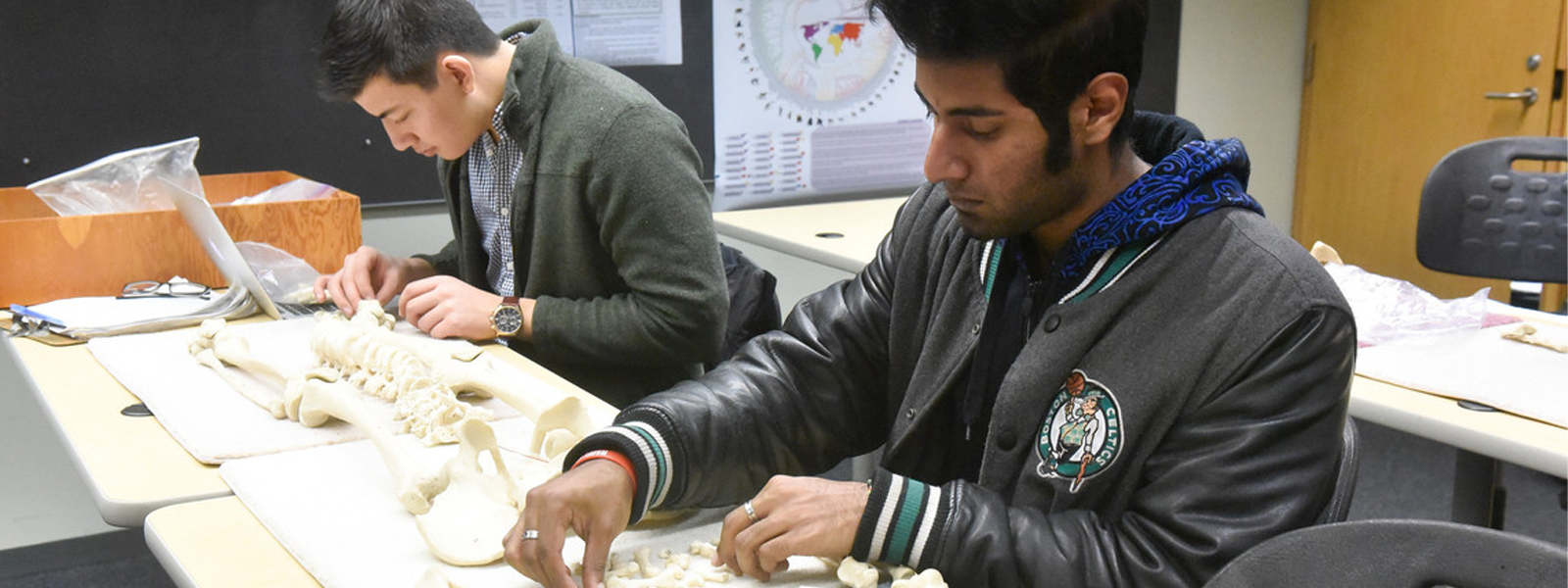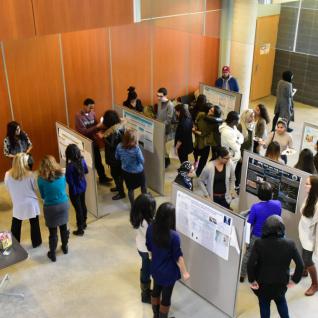Evolutionary Anthropology Major (HBSc)
Admissions Category: Physical & Environmental Sciences
Are you a prospective student applicant?
You can enter the Health Sciences Stream to accelerate your career in a health care profession

Program Overview
Anthropology is the study of humankind, dealing with the origin, development and nature of humans and their culture. The Major program in Evolutionary Anthropology provides a course structure for students desiring to expand upon or supplement other areas of academic interest by taking advantage of Anthropology’s unique global, chronological, and biological perspective on the human condition. In the Evolutionary Anthropology Stream (BSc), students understand how humans are related to non-hominid primates, changes in human behaviour and physiology, and what has influenced our transformation into Homo sapiens sapiens.
Complementary Programs:
Biology, Human Biology, Psychology, Mental Health Studies, Health Studies, Certificate in Bioarchaeology, etc.
Check out future career opportunities and skills acquired from completing this program:
Competencies & Skills
- Data Collection and Analysis
- Research Methods & Design
- Critical Thinking & Evaluation
- Effective Communication Skills
- Problem-Solving Skills
- Analytical Skills
- Applying Techniques and Knowledge
Careers for Graduates
- Educator or Researcher
- Public Administration
- Natural Resource Management
- Public Health
- National and International Agencies
- Museums and Research Institutes
- Government Policy and Management
- Environmental Research and Investigation
- Epidemiology
- Marketing Research
Further Education
- Anthropology
- Psychology
- Biology
- Conservation
- Veterinary Medicine
- Physical Therapy
- Forensic Science
- Business Administration
- Public Administration
- Health Studies
Program Pathway
Year 1 | Year 2 | Year 3 | Year 4Choose Your Courses Wisely
- 1.0 credit as follows: ANTA01H3 and ANTA02H3.
- Explore different kinds of courses; this will also help with fulfilling breadth requirements and electives.
- Use Degree Explorer to plan your courses and program of interest.
Develop Your Academic & Research Skills
- Schedule an appointment with your Program Librarian for in-depth research assistance with your assignments.
- Get writing support at the CTL Writing Centre.
Apply Theory to Practice
- Attend the UTSC Faculty Mix & Mingle Fair to connect with professors and learn more about their specialties.
- Start building your Co-Curricular Record (CCR) and search for Experiential Learning (EL)opportunities.
Become an Engaged Citizen (Locally & Globally)
- Get involved with the Anthropology Department Student Association (ADSA); also explore other relevant student clubs and activities on campus.
- Volunteer in DSL’s Alternative Reading Week to gain experience and knowledge about social change and community development.
Plan for Your Future Career
- Volunteer with organizations to explore your interests; check listings on CLNx.
- Attend the UTSC Get Experience Fair in September and register with SCSU’s Volunteer Network Program to explore opportunities.
Year 2
Choose Your Courses Wisely
- 0.5 credits in ANTB14H3 and 0.5 credits in ANTB15H3.
- 6.0 credits at the B-level or above, of which at least 3.0 credits must be at the C- or D-level (See Year 3). At least 5.5 credits must be composed of ANT courses identified as “Science credit” (See Year 3).
- Use Degree Explorer and meet with your Program Advisor to plan your courses.
Develop Your Academic & Research Skills
- Further develop your general academic skills by attending workshops offered by the Academic Advising & Career Centre (AA&CC) and Centre for Teaching & Learning (CTL).
Apply Theory to Practice
- Get involved in relevant opportunities on and/or off campus; apply to Work Study, or other part-time and summer jobs on CLNx.
Become an Engaged Citizen (Locally & Globally)
- Check CLNx to search for Work Study or volunteer positions on campus to gain experience and get involved.
- Volunteer with the Anthropology Department Student Association (ADSA) to expand your connections and enrich your university experiences.
Plan for Your Future Career
- Considering grad school? Speak to professors and advisors early so you are on track.
- Explore careers through the AA&CC’s Job Shadowing and In The Field programs.
Year 3
Choose Your Courses Wisely
- At least 3.0 credits must be at the C- or D-level.
- At least 5.5 credits must be composed of ANT courses identified as “Science credit” in the UTSC Academic Calendar
- Use Degree Explorer to ensure you are on track with your degree.
Develop Your Academic & Research Skills
- Consider competing for the UTSC Library Undergraduate Research Prize or Poster Forum.
Apply Theory to Practice
- Build on your skills and knowledge through relevant events offered through your department, student groups, DSL and the AA&CC.
Become an Engaged Citizen (Locally & Globally)
- Run for an elected position in the Anthropology Department Student Association (ADSA).
- Look into volunteering or working overseas to expand your network through International Student Centre’s (ISC) Global Learning programs.
Plan for Your Future Career
- Plan a career path with a staff member at the AA&CC.
- Check CLNx for networking events and employer information sessions to attend.
- Attend the Graduate & Professional School Fair in September.
Year 4
Choose Your Courses Wisely
- Make sure you have fulfilled your breadth requirements.
- Use Degree Explorer to ensure you are on track to graduate.
- Register your “Intent to Graduate” on ACORN by the deadline.
Develop Your Academic & Research Skills
- Apply for an Academic Travel Fund through the Department of Student Life (DSL) to research, present at a conference, or engage with the international academic community.
Apply Theory to Practice
- Attend the Summer & Full-time Job Fair in January to meet with potential employers looking to hire students for summer and full-time positions.
Become an Engaged Citizen (Locally & Globally)
- Participate in the AA&CC’s Partners in Leadership program to learn and network with an alumni mentor about transitioning to work or further education.
Plan for Your Future Career
- Attend the AA&CC’s Get Hired job search conference in April/May.
- Attend a Jobs for Grads orientation for a job search “crash course” and for access to full-time job listings.
- Get your Personal Statement reviewed in the AA&CC.
